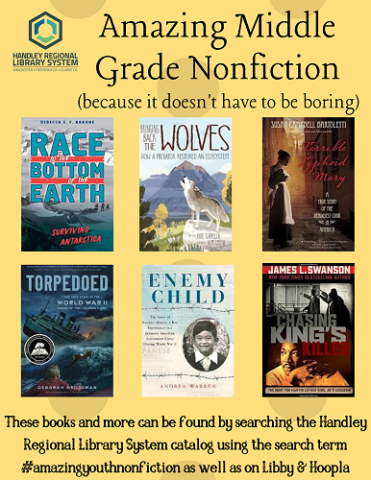
Our Middle Grade book spotlight this week is on more amazing nonfiction titles! It can be easy to think that nonfiction is boring but these titles are the complete opposite of that thought; we have everything from books about ecosystems to history through other lenses and an adventure that is so unbelievable you will think it is fiction but it isn’t; you will not even realize you are reading nonfiction because they are that good. These books and more can be found by searching the catalog using the search tag #amazingyouthnonfiction as well as on Libby and Hoopla. Check back next week for a new Middle Grade book spotlight and if you have any book suggestions, please let us know!!
Race to the Bottom of the Earth by Rebecca E.F. Barone--Filled with suspense and unwavering accounts of determination, this nonfiction account presents history-making treks to the South Pole by competing teams more than 100 years apart. In 1910, Captain Robert Scott prepared a team to be the first to reach the South Pole. Unbeknownst to him, Roald Amundsen was also preparing to be the first to reach the South Pole, leading both expeditions to race to be the first ones there. By 2018, no one had yet made a solo journey across Antarctica, but two men were hoping to change that, Captain Louis Rudd and elite athlete Colin O'Brady, resulting in another epic race.
Torpedoed by Deborah Heiligman--Recounts the attack on passenger ship SS "City of Benares" during WWII, which was carrying nearly 100 British children escaping from the German onslaught of England's major cities as part of the Children's Overseas Reception Board program. As their military escort departed on the way to Canadian ports, a German submarine torpedoed the ship, not knowing it was a civilian ship carrying children. The author draws on first-hand accounts of the tragedy, providing backstories of the children and chaperones while also documenting their experiences. Includes extensive backmatter including interviews.
Enemy Child by Andrea Warren--Discusses the life and career of former U.S. congressman Norman Mineta. At ten-years-old Norman and his family were interned at Heart Mountain Internment Camp during World War II. His experiences there prompted in him a spirit of public service, and he went on to become the first Asian mayor of a major city then served ten terms in the U.S. House of Representatives where he was instrumental in passing the Civil Liberties Act of 1988. Chronicles the history of Asian immigration to put the internment into historical context, and explores the lasting legacy of the government's policy of imprisoning Japanese immigrants.
Bringing Back the Wolves by Jude Isabella--When wolves disappeared from the landscape of Yellowstone National Park, wildlife managers began to notice that the ecosystem was quiet. Too quiet. Birds, insects, and other small creatures were virtually absent. To restore balance to the area, managers undertook a controversial project to introduce wolves back into Yellowstone National Park, which eventually resulted in a greater diversity of animals, plants, and insects.
Terrible Typhoid Mary by Susan Campbell Bartoletti--Little did young Irish immigrant Mary Mallon know when she set foot on American soil in 1883 at the age of 15, she would become one of the most dangerous women in the nation's history. The woman who would become known as Typhoid Mary is alleged to have infected over 50 people with the deadly disease in the course of her career as a cook. Previous biographies have emphasized Mallon's ignorance of her role as a carrier and her refusal to stop working despite being repeatedly quarantined, but author Bartoletti's well-researched biography plumbs new depths in Mallon's life, considering what her experiences reveal about human rights, the science of pathology, and the immigrant experience.
Chasing King’s Killer by James L. Swanson--Profiles the life and times of James Earl Ray--the man who assassinated Martin Luther King Jr. in 1968. Examines the politics of the time that influenced Ray, the crime itself, and the massive manhunt that ensued.